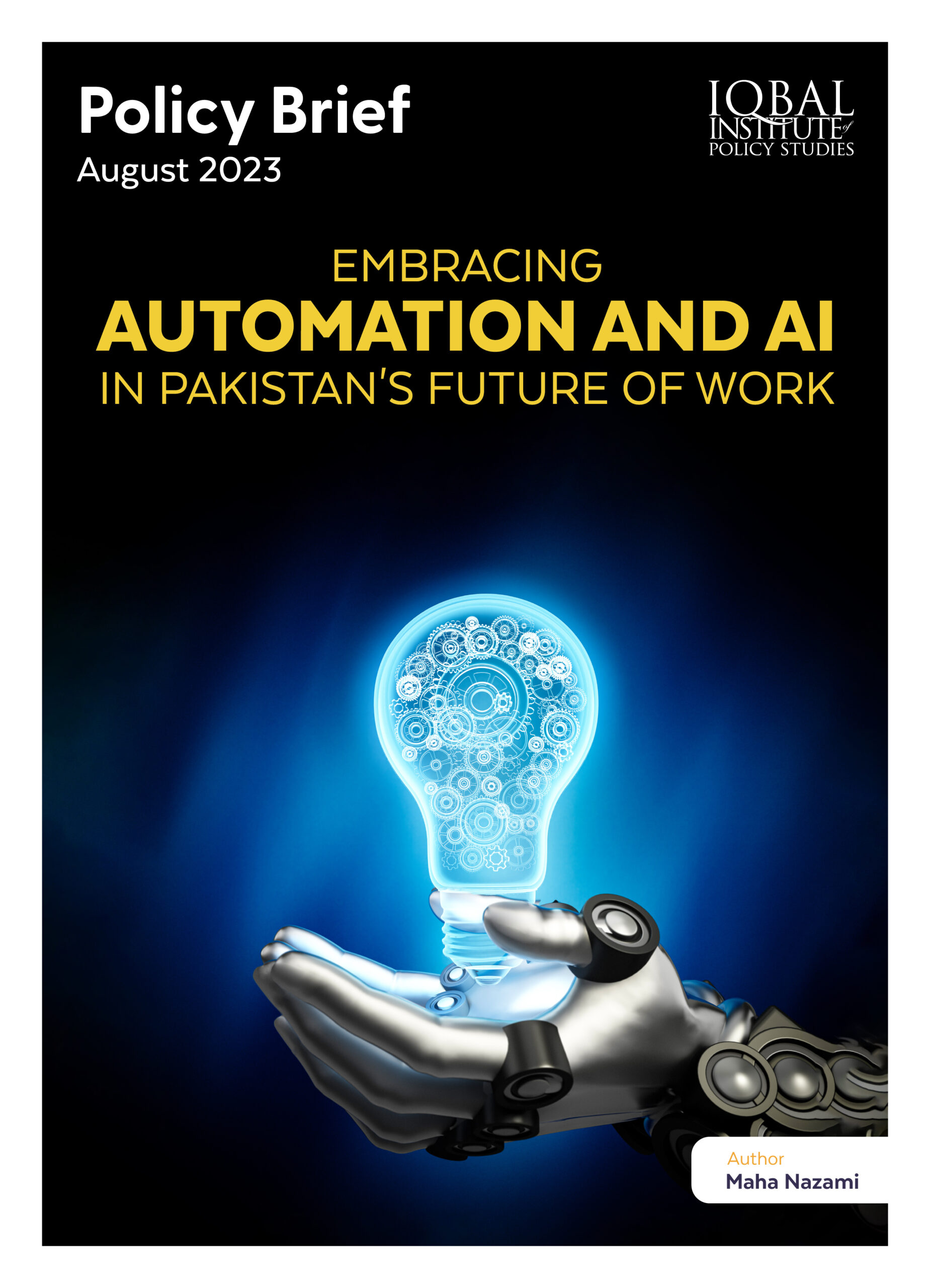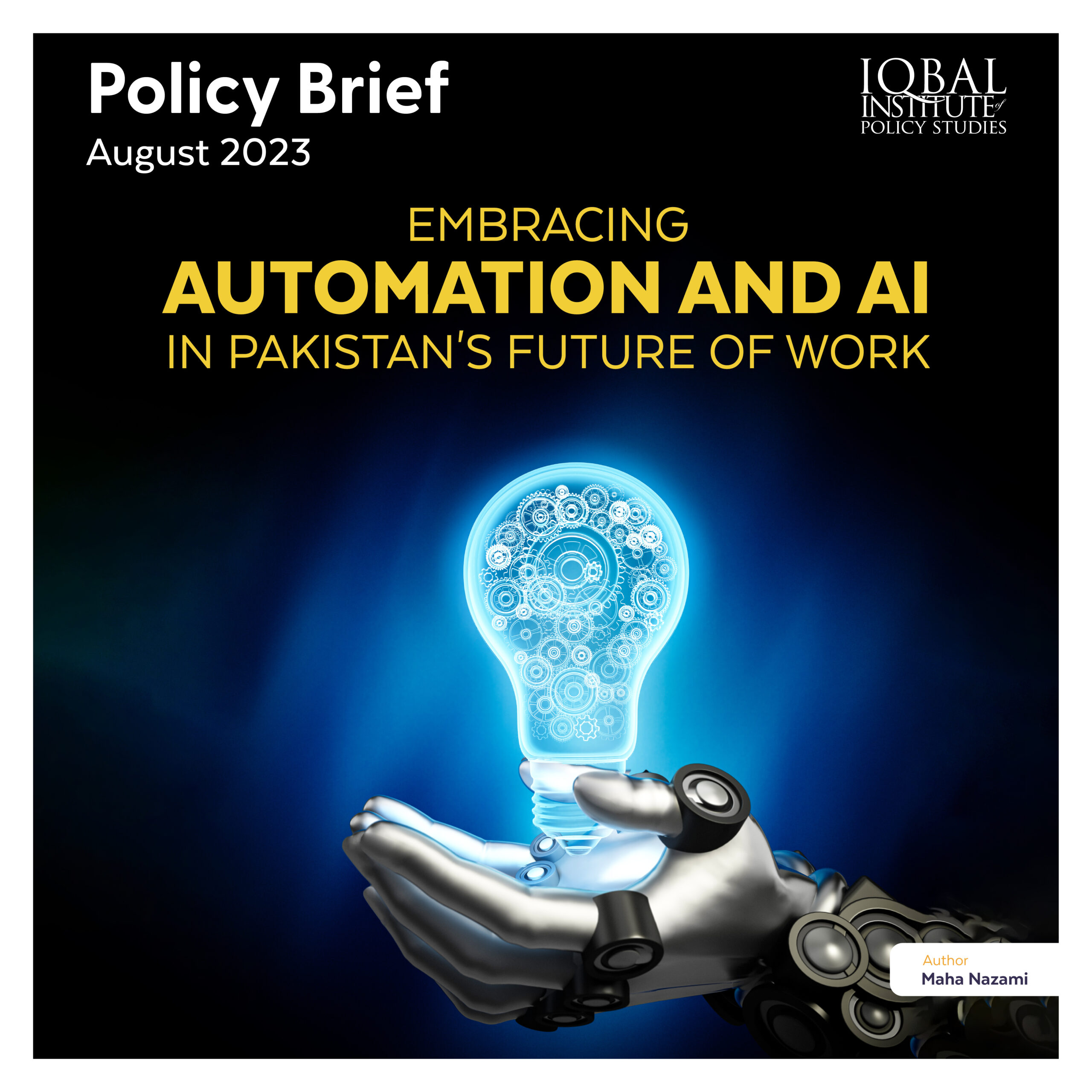Executive Summary
As the rapid integration of automation and artificial intelligence (AI) technologies reshapes industries globally, Pakistan stands at the crossroads of an unprecedented transformation in its job market. To address the challenges and harness the opportunities presented by automation and AI, this policy brief outlines a comprehensive strategy. By focusing on policies that prioritize reskilling and upskilling, establish resilient social safety nets, and ensure robust worker protection, Pakistan can effectively navigate this paradigm shift in the future of work.
Introduction
The dynamic fusion of technology and employment is ushering in an era of unprecedented change in Pakistan. The convergence of automation and AI technologies, while promising heightened efficiency and productivity is bringing about a time of big changes in the country. Pakistan needs to be ready and take action to make the most out of these technologies, while also finding ways to deal with the problems they might bring for workers.
In simpler terms, this means that as machines and computers become more important in how things get done, the way people work might change a lot. Pakistan has to be prepared for this change and make plans to use these new technologies well. At the same time, the government needs to think about how to help people who might lose their jobs because of these changes. This could be because machines do the work instead, and people need to learn new skills or find new jobs.
Pakistan’s economy, like much of the world, is on the cusp of a technological revolution that is redefining the nature of work. Automation and AI, once confined to the realms of science fiction, have now become tangible forces impacting industries, job roles, and workforce dynamics. According to a report by the International Labour Organization (ILO), as of 2020, 56% of workers in Pakistan were employed in sectors that could face significant automation. Moreover, the World Economic Forum predicts that by 2025, over 85 million jobs worldwide may be displaced by a shift in the division of labor between humans and machines, including AI.
Many people believe that AI (Artificial Intelligence) is the path that will lead us into the future. This is because AI has played a big role all around the world in helping economies and societies grow and improve. Even in Pakistan, there is a lot of potential for AI to be used as a tool to solve local problems in different areas like farming, factories, how the government works, and even in dealing with issues related to the environment and climate.
Current Situation and Opportunities
The current phase of AI’s advancement is marked by innovation, as various AI algorithms are presently being introduced. Although it’s true that AI can take over certain tasks currently done by people, it’s uncertain whether AI will completely replace humans in the future. AI is programmed for specific jobs, often carrying them out with great efficiency and precision, yet it lacks the human qualities of creativity, critical thinking, and emotional understanding.
Rather than a total substitution for human roles, AI is more likely to enhance human abilities. This means humans can concentrate on more intricate and advanced tasks that demand creativity, intuition, and emotional understanding. For instance, in the field of manufacturing, AI can handle repetitive jobs like assembly or quality control, freeing up human workers to tackle tasks that involve solving problems and making decisions. The IT field is growing really quickly in Pakistan and has become twice as large in the last 4-5 years. There are now more than 2000 IT companies and call centers in Pakistan, and this number keeps growing every year. Pakistan is hoping that new technology zones will create lots of job opportunities for young people in the country, increasing the demand of artificial intelligence. Artificial intelligence has big potential in Pakistan and is likely to change many industries in the country and make them better.
In 2018, the Pakistani government took a step to support AI by creating the National Centre of Artificial Intelligence (NCAI). This center was established to focus on AI-related projects and research, showing that the country is taking technology seriously. However, even though Pakistan has taken this step, there is still more that needs to be done to make AI a bigger part of the country’s growth. It’s like when you have a new toy – you need to learn how to use it well to get the most out of it. The same goes for AI. It’s a powerful tool that can do a lot of good, but it also has some drawbacks if not used properly.
Jobs for Artificial Intelligence in Pakistan
⁃ Data scientists
⁃ Robotics engineer
⁃ Machine learning engineer
⁃ Computer vision engineer
⁃ Natural language processing engineer
⁃ Business intelligence developer
⁃ Big data engineer or architect
⁃ Data developer
⁃ Data analyst
⁃ Research scientist
⁃ And much more
Challenges
Lack of awareness and understanding of the technology
A major obstacle to using AI in Pakistan is that not many people know much about it or understand how it works. Some people think AI might take away jobs and make work less secure for humans. Because of this, many people don’t really trust AI. Since there’s not enough awareness and understanding, it’s hard for companies to use AI in a good way.
Shortage of skilled professionals in AI field
Even though there are quite a number of individuals graduating with computer science degrees in Pakistan, there’s a notable scarcity when it comes to having experts specialized in AI – those who can actually design and put AI systems into action. This shortage of skilled professionals who truly understand the ins and outs of AI presents a significant hurdle for the AI industry’s expansion within Pakistan. Because of this scarcity of AI specialists, there’s a gap between the potential AI has and the ability to effectively use it in various sectors such as business, healthcare, or manufacturing. Without enough experts who can develop, apply, and maintain AI systems, these opportunities might not be fully realized.
Inadequate Infrastructure
Pakistan’s technological infrastructure, including access to high-speed internet and advanced computing resources, is not as developed as some of its regional counterparts. This hampers the efficient implementation and operation of AI systems that require robust infrastructure for data processing and analysis.
Legal and Ethical Concerns
The legal and ethical implications of AI are complex and evolving. In Pakistan, there might be a lack of clear regulations and guidelines concerning AI applications, which can lead to uncertainties and potential misuse. Addressing these concerns is important to ensure responsible and ethical AI adoption.
Data Quality Issues
AI heavily relies on data for training and learning. Poor data quality, lack of standardized data, and data privacy concerns can hinder the development of accurate and reliable AI models. Without access to high-quality data, AI systems may not perform as expected.
Insufficient Financial Support
AI research, development, and implementation require financial resources. Adequate funding for AI startups and companies might be lacking in Pakistan. Limited financial support can slow down innovation and stifle the growth of AI-related initiatives.
Limited Research and Development
Robust AI adoption requires continuous research and development efforts to keep up with advancements. A shortage of institutions and initiatives dedicated to AI research and development might hinder the country’s progress in this field. Educating various stakeholders about AI’s capabilities and limitations is crucial for fostering its adoption.
Interdisciplinary Collaboration
Successful AI implementation often requires collaboration between various disciplines such as computer science, mathematics, and domain-specific expertise. Encouraging interdisciplinary collaboration can be a challenge if there are gaps in understanding between different fields.
Policy and Government Support
A supportive policy environment and government initiatives can significantly boost AI adoption. Lack of clear policies, incentives, and strategic planning can hinder the integration of AI into various sectors of the economy.
Certainly, here are policy recommendations tailored to address each of the mentioned challenges:
Recommendations
-
Raise awareness and benefits about Artificial Intelligence
– Launch nationwide educational campaigns to raise awareness about AI and its potential benefits.
– Develop educational materials, workshops, and seminars targeting different age groups and professional backgrounds to promote AI literacy.
– Collaborate with educational institutions to integrate AI concepts into curricula at various levels.
-
Establish Training Institutes and Programs for Skill Development
– Establish AI centers of excellence within universities to offer specialized AI training programs and certifications.
– Introduce scholarship programs for students pursuing AI-related studies to encourage more individuals to enter the field.
– Facilitate partnerships between universities and industries to provide practical AI training and internships.
-
Infrastructure Development
– Invest in upgrading digital infrastructure, including high-speed internet connectivity and computing resources, in both urban and rural areas.
– Provide tax incentives to tech companies investing in infrastructure development.
– Create technology parks or zones dedicated to AI research and development with state-of-the-art facilities.
-
Develop Legal and Ethical framework
– Establish a national AI ethics board comprising experts from various fields to develop ethical guidelines and regulations for AI use.
– Collaborate with international organizations to adopt best practices in AI ethics and regulation.
– Conduct regular audits of AI systems to ensure compliance with ethical and legal standards.
-
Enhancement of Data Quality
– Develop data quality standards and encourage industries to adhere to them when collecting and sharing data.
– Introduce data privacy laws and mechanisms to protect individuals’ data rights and ensure data security.
– Establish data-sharing platforms that facilitate secure and controlled data exchange for AI training purposes.
-
Financial Support for Startups
– Establish government-funded grants and venture capital funds specifically targeted at AI startups and research initiatives.
– Create technology innovation funds that support AI projects with high potential impact.
– Encourage private sector partnerships with public funding to stimulate AI research and development.
-
Support Research and Development:
– Establish AI research centers and institutes in collaboration with universities, industries, and international research institutions.
– Offer grants and incentives for AI-focused research projects that aim to address local challenges.
– Encourage collaboration between research institutions and industries to bridge the gap between theory and practical applications.
-
Promote Interdisciplinary Collaboration:
– Facilitate interdisciplinary workshops and conferences that bring together experts from various fields to share knowledge and ideas.
– Establish interdisciplinary research hubs where professionals from different disciplines collaborate on AI-related projects.
– Develop joint degree programs that encourage students to combine AI expertise with domain-specific knowledge.
-
Offer incentives and form policies
– Formulate a comprehensive national AI strategy outlining clear goals, policies, and incentives to promote AI adoption across sectors.
– Establish regulatory sandboxes that allow AI startups and companies to test innovative solutions in a controlled environment.
– Collaborate with industry associations to develop industry-specific AI guidelines and standards.
By implementing these policy recommendations, Pakistan can address the challenges hindering AI adoption and create an environment conducive to the growth and responsible use of AI technologies.
Conclusion
By deftly navigating the challenges and prospects of automation and AI through a comprehensive strategy centered on reskilling, social safety nets, and worker protection, Pakistan can harness the potential of technological advancement while safeguarding the well-being of its workforce. This anticipatory approach not only empowers individuals to excel in an evolving job market but also positions Pakistan as a global leader in embracing the future of work with insight and compassion. The proposed framework, built upon adaptable policies, will pave the way for a future marked by technological prowess, social cohesion, and shared prosperity.
References
https://pakistananalysis.com/technology/scope-artificial-intelligence-pakistan/
https://www.eduvision.edu.pk/careers/index.php?id=114
https://academiamag.com/scope-of-artificial-intelligence-in-pakistan/
https://www.nation.com.pk/21-May-2023/ai-and-the-future



Leave a Reply